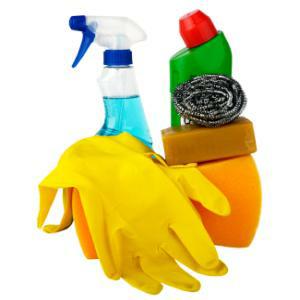
Pregnant women regularly exposed to a range of detergents, solvents and pesticides have a substantially greater risk of giving birth to boys with genital deformities, according to a new French study.
The research, led by two professors at the Regional University Hospital Centre in the French city of Montpellier, found that women who regularly work with such chemicals, including cleaners and hairdressers, were at greatest risk of having sons born with hypospadias.
The birth defect, which affects about three in 1,000 newborn boys, is a condition where the urinary opening is abnormally positioned on the penis.
Hypospadias can be treated with surgery but it can affect the boy's fertility once he reaches adulthood.
Read: Household products tied to lung damage
The study, led by paediatric surgeon Nicolas Kalfa and paediatric endocrinologist Charles Sultan, was carried out over five years and examined 600 children at hospitals in four French cities, 300 of whom were boys born with hypospadias.
"The study shows for the first time that regular professional or domestic exposure (to these chemicals), and more generally being in contact with them, seriously raises the risk of genital deformity," Sultan told AFP.
A summary of the research said boys were three times more likely to be born with hypospadias if they had been exposed to chemicals that interfered with their endocrine systems in the womb at the moment when the sex of the foetus is determined.
Read:
Both parents' professions and where they live can play a role
The study identifies mothers working as cleaners or housekeepers, hairdressers, beauticians and laboratory workers as being particularly at risk.
For the father, being a farmer, lab worker, cleaner, mechanic or painter was found to bring a greater chance of the son having the defect.
Living within three kilometres (1.8 miles) of an incinerator, landfill site or a chemical factory brings a greater risk of having a son with hypospadias, Sultan said.
"For a long time there has been contradictory data over the genetic and environmental causes," Sultan added.
How to know which products are harmful and what to do
The chemicals and product brand names
Not all ingredients are required to be listed on all household cleaning products, but by law these have to be declared on personal care products.
Among the chemicals detected were various types of phthalates (phthalates are usually indicated by non-specific "fragrance" on many labels and is a chemical found in detergents that are swiftly absorbed by skin, fingernails, and lungs) which has been linked to causing birth defects and reproductive abnormalities and asthma; bisphenol A (BPA), which is being phased out of many baby bottles and children's toys because of concerns about the effect on foetuses and young children; and parabens, or chemical preservatives, which some research suggests may mimic oestrogen in the body and have been associated with breast cancer.
Look out for these chemicals:
- Aerosol propellants
- Ammonia
- Chlorine/Sodium hypochlorite
- Formaldehyde
- Fragrance
- Organic solvents
- Phosphates
- Phthalates
- Sodium
- Synthetic surfactants
Some statistics via www.urbansprout.co.za
- Of the 17 000 petrochemicals available for home use, only 30% have been tested for their
- Of chemicals commonly found in homes, 150 have been linked to allergies, birth defects, cancer, and psychological abnormalities.
- Only 1% of toxins are required to be listed on
- In the past 50
- Bleach, paint stripper and carpet cleaners used in the home can cause wheezing and asthma in children.
We advise that you switch to natural cleaning methods and protection for yourself and children by:
- choosing products that are plant-based,
- using water, baking soda and vinegar for cleaning,
- wearing hats and cover-ups instead of relying only on sunscreen for sun protection,
- steering clear of cleaning and other products that contain fragrance,
- avoiding vinyl pillow and mattress protectors,
- choosing lotions, deodorants and shampoos that are paraben-free
- always wear gloves when dyeing your or somebody else's hair
- visit the US-based website EWG Skin Deep for database and reports on unsafe and safe products
Read more:
Air pollution may lower children's IQ




 Publications
Publications
 Partners
Partners










